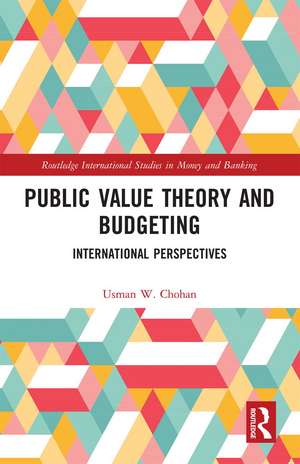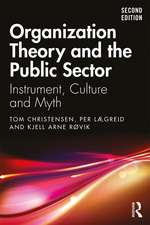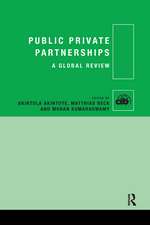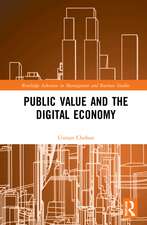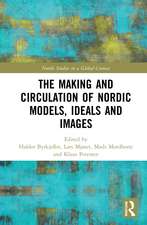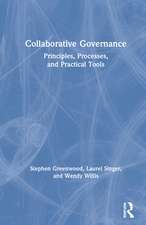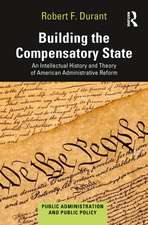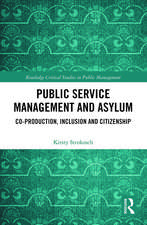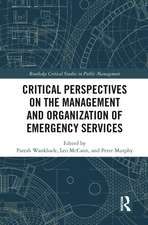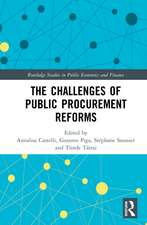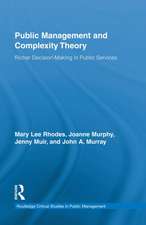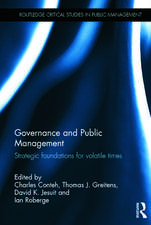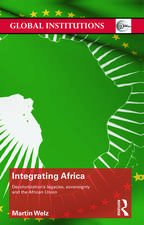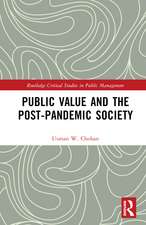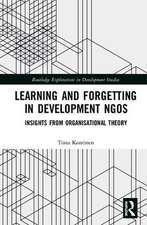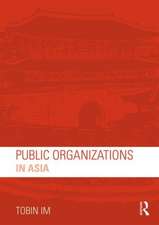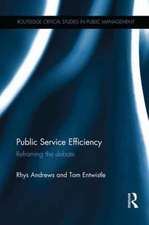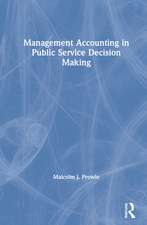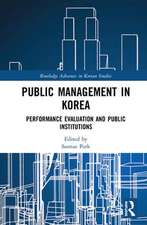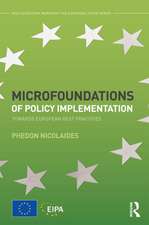Public Value Theory and Budgeting: International Perspectives: Routledge International Studies in Money and Banking
Autor Usman W. Chohanen Limba Engleză Paperback – 18 dec 2020
Pushing the debate on public value forward and taking it onto the global stage, the book asks whether public value (and other public administration theories) are applicable beyond the traditional context of the pro-globalization Western liberal democracies in which they were conceived. It does this by exploring the realms of developing countries, supranational entities, and post-Communist societies, among others. Finally, it presents these explorations in light of very recent sociopolitical trends and phenomena, including the growth of civil society, the global financial crisis, the illiberal democracy, and the post-truth era.
Tailored to an audience comprising public administration scholars, students of government, budget practitioners, and social scientists interested in contemporary problems of values in society, this book helps to advance public administration thought by extending public value theory into new contexts and relating it to the growing global challenges of public life.
| Toate formatele și edițiile | Preț | Express |
|---|---|---|
| Paperback (1) | 269.60 lei 6-8 săpt. | |
| Taylor & Francis – 18 dec 2020 | 269.60 lei 6-8 săpt. | |
| Hardback (1) | 997.90 lei 6-8 săpt. | |
| Taylor & Francis – 18 iun 2019 | 997.90 lei 6-8 săpt. |
Din seria Routledge International Studies in Money and Banking
-
 Preț: 309.94 lei
Preț: 309.94 lei -
 Preț: 325.16 lei
Preț: 325.16 lei -
 Preț: 284.40 lei
Preț: 284.40 lei -
 Preț: 313.60 lei
Preț: 313.60 lei -
 Preț: 311.41 lei
Preț: 311.41 lei -
 Preț: 307.47 lei
Preț: 307.47 lei -
 Preț: 313.17 lei
Preț: 313.17 lei -
 Preț: 341.57 lei
Preț: 341.57 lei -
 Preț: 309.87 lei
Preț: 309.87 lei -
 Preț: 310.84 lei
Preț: 310.84 lei - 9%
 Preț: 864.85 lei
Preț: 864.85 lei -
 Preț: 664.77 lei
Preț: 664.77 lei - 18%
 Preț: 1175.01 lei
Preț: 1175.01 lei - 18%
 Preț: 1122.64 lei
Preț: 1122.64 lei - 18%
 Preț: 1056.00 lei
Preț: 1056.00 lei - 18%
 Preț: 1067.14 lei
Preț: 1067.14 lei - 27%
 Preț: 148.98 lei
Preț: 148.98 lei - 25%
 Preț: 503.80 lei
Preț: 503.80 lei - 18%
 Preț: 1058.79 lei
Preț: 1058.79 lei - 26%
 Preț: 820.40 lei
Preț: 820.40 lei - 18%
 Preț: 1058.79 lei
Preț: 1058.79 lei - 28%
 Preț: 821.46 lei
Preț: 821.46 lei - 18%
 Preț: 1057.40 lei
Preț: 1057.40 lei - 26%
 Preț: 765.01 lei
Preț: 765.01 lei - 18%
 Preț: 1056.28 lei
Preț: 1056.28 lei - 15%
 Preț: 254.03 lei
Preț: 254.03 lei - 18%
 Preț: 1064.70 lei
Preț: 1064.70 lei - 18%
 Preț: 1113.25 lei
Preț: 1113.25 lei - 18%
 Preț: 702.31 lei
Preț: 702.31 lei - 18%
 Preț: 1166.68 lei
Preț: 1166.68 lei - 26%
 Preț: 849.37 lei
Preț: 849.37 lei - 18%
 Preț: 1116.38 lei
Preț: 1116.38 lei - 25%
 Preț: 851.99 lei
Preț: 851.99 lei - 18%
 Preț: 1060.87 lei
Preț: 1060.87 lei - 25%
 Preț: 823.57 lei
Preț: 823.57 lei - 18%
 Preț: 1114.70 lei
Preț: 1114.70 lei - 25%
 Preț: 824.53 lei
Preț: 824.53 lei - 29%
 Preț: 1188.26 lei
Preț: 1188.26 lei - 25%
 Preț: 853.07 lei
Preț: 853.07 lei - 18%
 Preț: 1114.30 lei
Preț: 1114.30 lei -
 Preț: 418.22 lei
Preț: 418.22 lei - 30%
 Preț: 854.10 lei
Preț: 854.10 lei - 18%
 Preț: 1060.25 lei
Preț: 1060.25 lei - 18%
 Preț: 1165.73 lei
Preț: 1165.73 lei - 18%
 Preț: 1056.00 lei
Preț: 1056.00 lei - 30%
 Preț: 851.82 lei
Preț: 851.82 lei - 18%
 Preț: 1059.48 lei
Preț: 1059.48 lei - 18%
 Preț: 1240.95 lei
Preț: 1240.95 lei - 29%
 Preț: 1187.46 lei
Preț: 1187.46 lei
Preț: 269.60 lei
Preț vechi: 340.05 lei
-21% Nou
Puncte Express: 404
Preț estimativ în valută:
51.59€ • 53.67$ • 42.59£
51.59€ • 53.67$ • 42.59£
Carte tipărită la comandă
Livrare economică 15-29 aprilie
Preluare comenzi: 021 569.72.76
Specificații
ISBN-13: 9780367728519
ISBN-10: 0367728516
Pagini: 166
Dimensiuni: 156 x 234 mm
Greutate: 0.31 kg
Ediția:1
Editura: Taylor & Francis
Colecția Routledge
Seria Routledge International Studies in Money and Banking
Locul publicării:Oxford, United Kingdom
ISBN-10: 0367728516
Pagini: 166
Dimensiuni: 156 x 234 mm
Greutate: 0.31 kg
Ediția:1
Editura: Taylor & Francis
Colecția Routledge
Seria Routledge International Studies in Money and Banking
Locul publicării:Oxford, United Kingdom
Public țintă
Postgraduate and UndergraduateCuprins
1 Introduction PART I: Extending public value to new contexts 2 Public value, civil society and developing countries 3 Supranational entities and defining the “public” in public value” 4 Public value in post-communist societies PART II: Challenges in public value creation 5 Public value and illiberal democracy 6 Public value between nations 7 Public value and the post-truth era 8 Conclusion
Notă biografică
Usman W. Chohan, PhD, is a public value theorist and a post-doctoral fellow at the University of New South Wales, Australia. He has previously served at the National Bank of Canada and the World Bank. He was included among Australia’s 50 Top Thinkers by the Conversation in 2016. He has resided in ten countries on five continents and is President of the International Association of Hyperpolyglots, with fluency in eight different languages. His previous research has been cited in parliamentary reviews and motions in Australia and Canada. He has been a Global Shaper of the World Economic Forum and is today included among the leading Business Authors in the rankings of the Social Science Research Network.
Descriere
This book examines public value theory with a new lens to show that its problems can be systematically engaged through international budgeting perspectives, and that the vitality of public value theory can be applied towards the pressing socio-administrative problems of our times, and within contexts from around the world.
